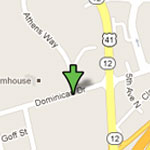Today we celebrate the Solemnity of Mary, Mother of God. As the Catechism of the Catholic Church states:
495 Called in the Gospels “the mother of Jesus,” Mary is acclaimed by Elizabeth, at the prompting of the Spirit and even before the birth of her son, as “the mother of my Lord.” In fact, the One whom she conceived as man by the Holy Spirit, who truly became her Son according to the flesh, was none other than the Father’s eternal Son, the second person of the Holy Trinity. Hence the Church confesses that Mary is truly “Mother of God” (Theotokos).
Twenty years ago Creeds and Councils were foreign concepts to me. The idea of acknowledging Mary as Mother of God as we do in the Solemnity today would have been unthinkable. Like most Protestants Marian dogmas and beliefs were one of the major issues I had before converting. Although this dogma was one of the easiest to accept as I saw how what the Church taught about Mary protected key beliefs about Christ. How could God, who is uncreated, have a mother? He could if He became a man. To be really, fully human He would have to have a mother. And if Jesus was really, fully divine then His mother would have to be Mother of God.
I can think of no better summation of the dogma than to cite the relevant section form Ott’s Fundamentals of Catholic Dogma:
Mary’s Motherhood of God
§ 1. Reality of Mary’s Motherhood of God
1. The Nestorian Heresy
The denial of the true humanity of Christ involves the denial of the true motherhood of Mary and the denial of the Divinity of Christ logically also leads to the denial of Mary’s motherhood of God. Thus the Nestorians refused to recognise Mary’s title θεοτόκος (= Mother of God), and designated her by the names ἀνθρωποτόκος (= Mother of Man) or χριστοτόκος (= Mother of Christ).
2. The Dogma
Mary is truly the Mother of God. (De fide.)
In the Apostles’ Creed the Church professes her belief in the Son of God, “born of the Virgin Mary.” As the Mother of the Son of God, Mary is the Mother of God. The Council of Ephesus (431) with St. Cyril of Alexandria declared against Nestorius: “If any one does not confess that the Emmanuel (Christ) in truth is God and that on this account the Holy Virgin is the Mother of God (θεοτόκος)—since according to the flesh she brought forth the Word of God made flesh—let him be anathema.” D 113. The subsequent General Councils repeated and confirmed this doctrine. Cf. D 148, 218, 290.
The dogma of Mary’s motherhood of God contains two truths—
a) Mary is truly a mother, that is, she contributed everything to the formation of the human nature of Christ, that every other mother contributes to the formation of the fruit of her body;
b) Mary is truly the Mother of God, that is, she conceived and bore the Second Person of the Divinity, not indeed according to the Divine Nature, but according to the assumed human nature.
3. Proof from Scripture and Tradition
Scripture implicitly affirms Mary’s Divine motherhood by attesting, on the one hand, the true Divinity of Christ (see Christology), and on the other hand, Mary’s true motherhood. Thus Mary is called: “Mother of Jesus” (John 2:1); “His Mother” (Mt. 1:18; 2:11, 13, 20; 12:46; 13:55); “Mother of the Lord” (Luke 1:43). Mary’s true motherhood is clearly foretold by the Prophet Isaias: “Behold a virgin shall conceive and bear a Son and his name shall be called Emmanuel” (714). In similar words the angel transmits to Mary the message: “Behold thou shalt conceive in thy womb, and shalt bring forth a Son and thou shalt call his name Jesus” (Luke 1:31). The motherhood of God is included in the words of St. Luke 1:35: “The Holy Ghost shall come upon thee, and the power of the Most High shall overshadow thee. And therefore also the Holy which shall be born of thee shall be called the Son of God,”
Ott, L. (1957). Fundamentals of Catholic Dogma (pp. 196–197). St. Louis: B. Herder Book Company.


 Our meetings are held at the Motherhouse located at:
Our meetings are held at the Motherhouse located at: Sunday, May 3rd, 2014
Sunday, May 3rd, 2014 Interested in joining the Lay Dominicans?
Interested in joining the Lay Dominicans?